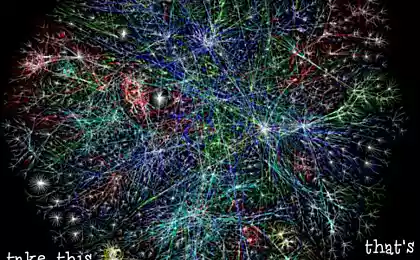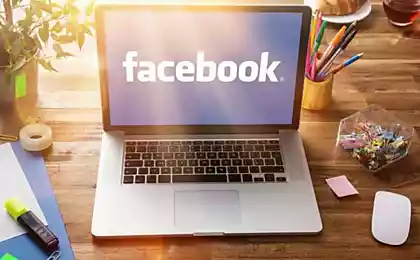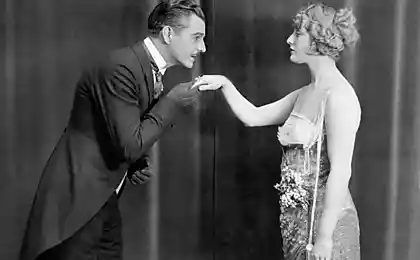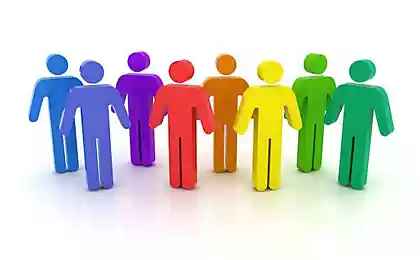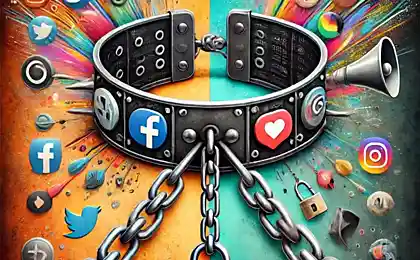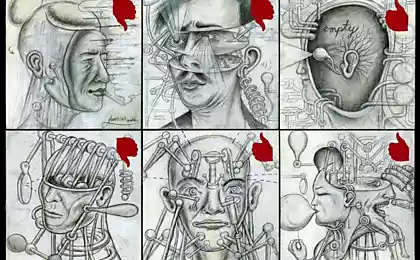711
That's what will happen if You will "like" all the posts in social networks
What happens if you "like" all the posts in social networks, who you meet? Ramit Chawla, founder of Fueled, specializing in mobile app development, tried to do so, and that's what he received as a result:
The likes that we share in social networks, are inconsistent. But, nevertheless, they are very important. They demonstrate our human qualities such as interest, curiosity, excitement, etc. But what if we could understand the psychology of social networks and to use this knowledge in order to be closer to their audience and give her what she wants? What if we could build the perfect relationship with your subscribers? Let's see how. Biology: Dopamine and oxytocin, Scientists believed that dopamine is the chemical element whose production is accompanied by pleasure, but it is now known that it activates desire. The production of dopamine contributes to obtaining of interesting information in small portions – that is, almost like it is done in social networks. Dependence on dopamine stronger, than from alcohol or cigarettes – a recent study showed that people are difficult to refuse from tweeting than from a daily serving of nicotine. Oxytocin Oxytocin is also called the "hug hormone" because it is produced when we hug or kiss someone. And yet when we write tweets. Yes, 10 minutes in social networks the level of oxytocin in our body is increased by 13% – this hormonal surge people experience only in their wedding day. And all the feelings that brings oxytocin is elevated mood, reduced stress level, sense of fun, love, generosity – all of this through the social networks. As a result, users of social networks are much more gullible than the average Internet denizen. The average user of Facebook is 43% more likely to believe in the veracity of the posts, which are read than the user that is not registered in the social network. In other words, we spend a lot of time in social networks, because it brings us positive emotions. And of course, because I'm waiting for more pleasure. Why we write posts of what we love to talk about themselves. People generally assign 30-40% of conversations discussing ourselves. But online, that figure increases to 80%. Why? Because communicating face-to-face, we have no time to think carefully about their words, and have to waste time on body language. But when we go out to the network, we have the thinking time phrases, to cut off all the excess. This is what psychologists call self-presentation: we portray ourselves the way we want to be. Psychologists also note that in the work on the self-presentation we can best help the things we purchase – they are showing the world who we are and what we represent. Just imagine: a recent experiment demonstrated that the feelings that one experiences looking at a photo of his best friend, comparable to the feelings that he had looking at the logo of his favorite brand. We can say that our relationship with brands has long outgrown in something more than simple interest. All this – the reason for the high activity of users in social networks. Why we rassharivat If we love to talk about themselves, then why do we rassharivat other people's posts? And here again we turn to science, with 68% of participants in study on the psychology of sharing, said people's posts, which they shared, represent their interests. However, most importantly, 78% of respondents said that sharing allows them to stay connected with other people. 62% of respondents noted that they feel better when they see a positive response to your repost. How this could be useful to brands? They need to learn to talk with your audience in a way that stimulated interest. You need to learn how to use relevant topics, such as the sensational story with white gold (or blue-black?) dress. Why are we "lichaam" 44% of users of Facebook put a mark "like" friends at least once a day and 29% do so several times a day. All this is happening for the sake of maintaining good relations, but also because of feelings of reciprocity, that is, the desire to respond to the actions of friends the same. This is confirmed by the experiments: a sociologist sent out 600 Christmas cards to strangers, and to him the answer was 200 greetings. Why we comment on a Study of the news sites showed that user comments, even not leading any facts that can change our opinion about a particular news almost dramatically. And polite answers brands on comments in social networks, even if they are negative, more conducive to the desire of the subscribers to buy the product than if the negative reviews are simply deleted. Emojis and selfies
Selfie The phenomenon of the selfie is a very important topic. Why we love them so much? It turns out that we are much more attention to individuals and not something else. The first thing we look at in social media is the profile photo. For example, in Instagram photos, which show people's faces get 38% more likes. So brands definitely worth to think about it. Emoji Emoji are designed to fill the text with what he lacks, that is, emotions. Studies have shown that, in the USA 74% of people regularly use emojis and stickers. This means that every day in the world goes about 6 billion Emoji. The results from another study showed that the use of emojis in communication with customers leads to higher loyalty of the audience.published
P. S. And remember, just changing your mind — together we change the world! ©
Join us in Facebook , Vkontakte, Odnoklassniki
Source: www.seonews.ru/analytics/psikhologiya-sotsialnykh-setey/
- The number of its subscribers increased by 30 per day.
- Him began to invite to parties.
- It began to learn on the street people subscribed to his account in Instagram.
- He began to constantly receive messages from friends, asking for him to post more often (it seemed that they needed content they could "like").
The likes that we share in social networks, are inconsistent. But, nevertheless, they are very important. They demonstrate our human qualities such as interest, curiosity, excitement, etc. But what if we could understand the psychology of social networks and to use this knowledge in order to be closer to their audience and give her what she wants? What if we could build the perfect relationship with your subscribers? Let's see how. Biology: Dopamine and oxytocin, Scientists believed that dopamine is the chemical element whose production is accompanied by pleasure, but it is now known that it activates desire. The production of dopamine contributes to obtaining of interesting information in small portions – that is, almost like it is done in social networks. Dependence on dopamine stronger, than from alcohol or cigarettes – a recent study showed that people are difficult to refuse from tweeting than from a daily serving of nicotine. Oxytocin Oxytocin is also called the "hug hormone" because it is produced when we hug or kiss someone. And yet when we write tweets. Yes, 10 minutes in social networks the level of oxytocin in our body is increased by 13% – this hormonal surge people experience only in their wedding day. And all the feelings that brings oxytocin is elevated mood, reduced stress level, sense of fun, love, generosity – all of this through the social networks. As a result, users of social networks are much more gullible than the average Internet denizen. The average user of Facebook is 43% more likely to believe in the veracity of the posts, which are read than the user that is not registered in the social network. In other words, we spend a lot of time in social networks, because it brings us positive emotions. And of course, because I'm waiting for more pleasure. Why we write posts of what we love to talk about themselves. People generally assign 30-40% of conversations discussing ourselves. But online, that figure increases to 80%. Why? Because communicating face-to-face, we have no time to think carefully about their words, and have to waste time on body language. But when we go out to the network, we have the thinking time phrases, to cut off all the excess. This is what psychologists call self-presentation: we portray ourselves the way we want to be. Psychologists also note that in the work on the self-presentation we can best help the things we purchase – they are showing the world who we are and what we represent. Just imagine: a recent experiment demonstrated that the feelings that one experiences looking at a photo of his best friend, comparable to the feelings that he had looking at the logo of his favorite brand. We can say that our relationship with brands has long outgrown in something more than simple interest. All this – the reason for the high activity of users in social networks. Why we rassharivat If we love to talk about themselves, then why do we rassharivat other people's posts? And here again we turn to science, with 68% of participants in study on the psychology of sharing, said people's posts, which they shared, represent their interests. However, most importantly, 78% of respondents said that sharing allows them to stay connected with other people. 62% of respondents noted that they feel better when they see a positive response to your repost. How this could be useful to brands? They need to learn to talk with your audience in a way that stimulated interest. You need to learn how to use relevant topics, such as the sensational story with white gold (or blue-black?) dress. Why are we "lichaam" 44% of users of Facebook put a mark "like" friends at least once a day and 29% do so several times a day. All this is happening for the sake of maintaining good relations, but also because of feelings of reciprocity, that is, the desire to respond to the actions of friends the same. This is confirmed by the experiments: a sociologist sent out 600 Christmas cards to strangers, and to him the answer was 200 greetings. Why we comment on a Study of the news sites showed that user comments, even not leading any facts that can change our opinion about a particular news almost dramatically. And polite answers brands on comments in social networks, even if they are negative, more conducive to the desire of the subscribers to buy the product than if the negative reviews are simply deleted. Emojis and selfies
Selfie The phenomenon of the selfie is a very important topic. Why we love them so much? It turns out that we are much more attention to individuals and not something else. The first thing we look at in social media is the profile photo. For example, in Instagram photos, which show people's faces get 38% more likes. So brands definitely worth to think about it. Emoji Emoji are designed to fill the text with what he lacks, that is, emotions. Studies have shown that, in the USA 74% of people regularly use emojis and stickers. This means that every day in the world goes about 6 billion Emoji. The results from another study showed that the use of emojis in communication with customers leads to higher loyalty of the audience.published
P. S. And remember, just changing your mind — together we change the world! ©
Join us in Facebook , Vkontakte, Odnoklassniki
Source: www.seonews.ru/analytics/psikhologiya-sotsialnykh-setey/
A non-trivial recipe pickled pumpkin "Estonian pineapple"
Cocoa butter: a miracle cure for Your beauty

